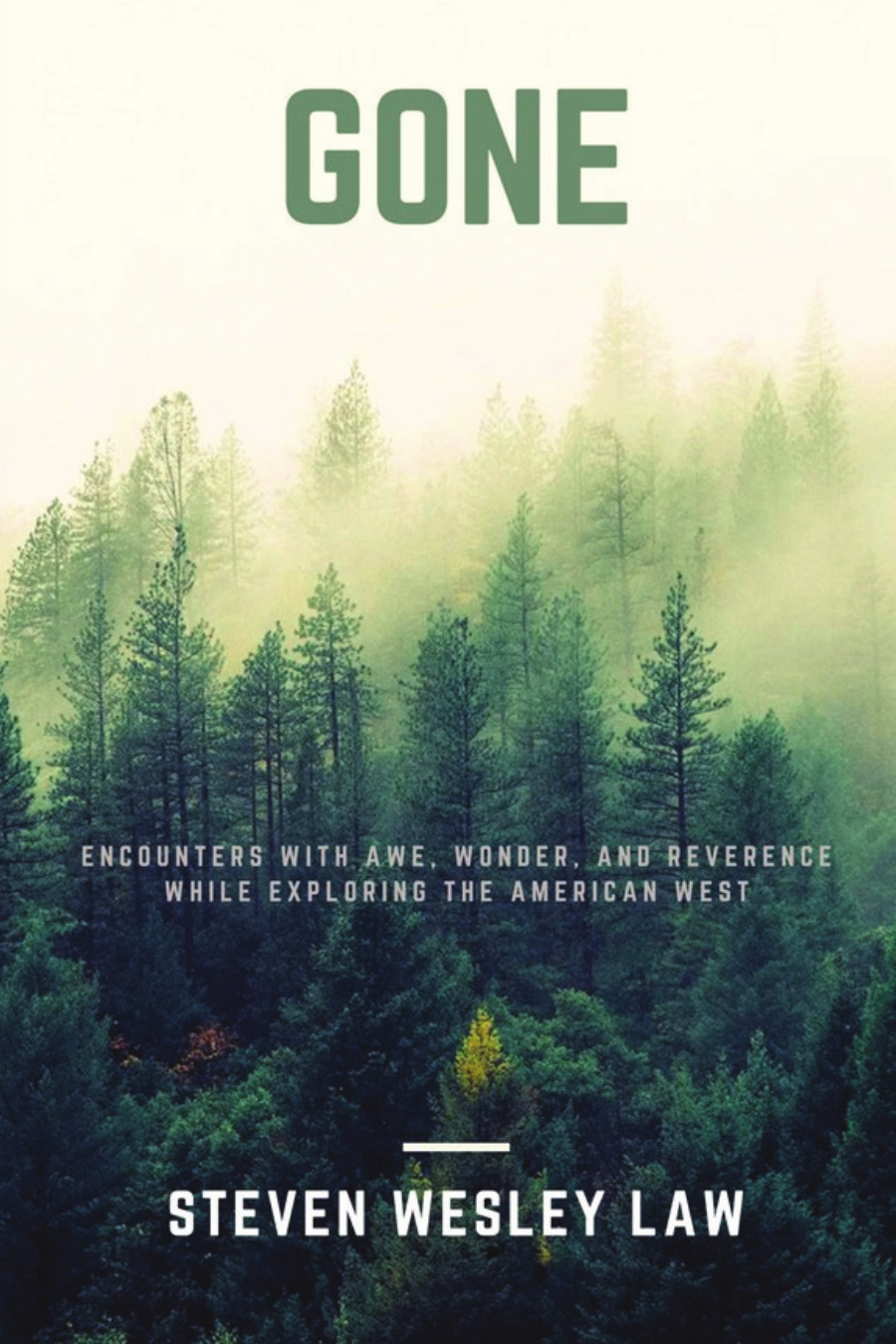

GONE
ENCOUNTERS WITH AWE, WONDER, AND REVERENCE WHILE EXPLORING THE AMERICAN WEST
"Steven Wesley Law captures the essence of the American wilderness with a voice that merges the precision of a journalist and the soul of a poet."
—David Anthony Martin, author of Bijoux, and The Ground Nest
“Steven Law is an observant and lyrical writer who evokes the wilderness experience in clear clean prose that is sometimes amusing, sometimes profound, and always delightful."
—Tim Cahill, founding editor of Outside magazine
"In the style of a good campfire yarn, Steven Law’s Gone wanders the deserts, canyons, waterways, and shorelines of the American West with an eye for wonder, a voice full of humor, and a never-ending thirst for the elusive moments of spiritual transcendence that only occur in the wild. Budding backpackers, kayakers, surfers, anglers, and river rafters will love this book."
—Melissa L. Sevigny, author of Brave the Wild River
In Gone, Steven Wesley Law captures the essence of the American wilderness with a voice that merges the precision of a journalist and the soul of a poet. Through activities like backpacking, snowshoeing, sea kayaking, surfing, rafting, and fishing, Law transports readers to the heart of nature's splendor. His essays, infused with personal reflections and vivid descriptions, offer a visceral experience of America's diverse landscapes, from the arid deserts to the misty coasts.
Law’s storytelling invites readers to slow down and savor the beauty of the natural world. His desert excursions, highlighting the practice of Sabaku Yoku, or Desert Bathing, are particularly evocative. Here, one can almost feel the cool relief of shade beneath a juniper, the pulse of ozone in the air, and the soothing warmth of the sun. His narratives make you reach for your water bottle and relish in the scent of coffee brewing on a camp stove.
The sea kayaking sections envelop you in the mists and rains of the Pacific Northwest, where you encounter black bears, orcas, and the formidable power of the sea. Law’s detailed accounts make you feel your muscles straining against the wind, seeking refuge in the lee of a small island. His surfing tales echo the freedom and exhilaration of a teenage beach-bum dream, where the pursuit of the perfect wave takes precedence over all else.
In his backpacking adventures, Law's meticulous division of gear into Essentials & Transcendentals reveals a thoughtful approach to embracing the wild. Gone is not just a tribute to the American West’s beauty and serenity but a celebration of its spiritual power. Law’s writing encourages readers to reconnect with nature, offering a path to discover their own moments of reverence and adventure.
There is a refinement of power in the relation of the awe Law finds in the wild, what might be considered by some to be its spiritual or sacred power—that of unity and connection— encouraging readers to reconnect with the natural world and discover their own moments of reverence and adventure. Steven Wesley Law’s Gone is a masterful exploration of awe, wonder, and reverence, making it a must-read for anyone seeking to experience the transformative power of nature.
- 240 pages
- Paperback
- 6in × 9in
- Black & White
- 978-195748328-3
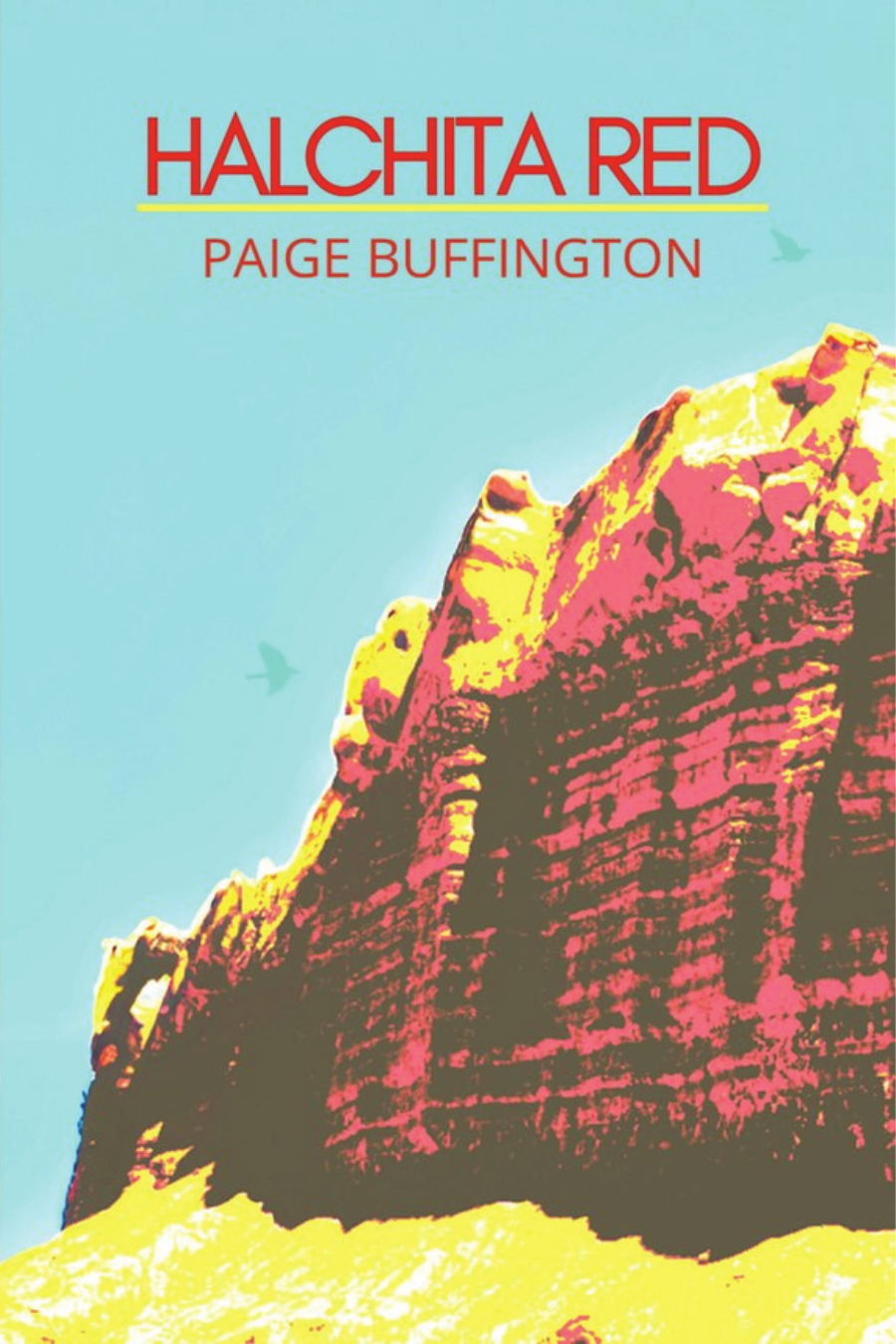

Halchita Red
ADVANCE PRAISE for HALCHITA RED
Oh, this book. With gritty intimacy, cinematic poetics, and clear-eyed devotion, Paige Buffington transports us through memory and dream to a place where time might be told by the migration of cranes. Where the elders tell stories and sing Johnny Cash and the AM radio plays All Navajo, All the Time. Where warm corn cake just pulled up from the earth is shared and the boots leave red prints. Buffington explores not only what is home, but who is our home? Who leaves? Who returns? And how do we carry home with us wherever we are, marked forever by its wounds, its gifts, its landscapes, its heartbreaks, its language, its traditions, its love. So quietly, so surely, Halchita Red transported me.
—Rosemerry Wahtola Trommer, author of The Unfolding and host of The Poetic Path
In Halchita Red, Buffington offers a text — or rather, a voice — a sepia light, a visceral reminder of what has survived with its beauty intact, despite what 400 years of colonization continues to attempt to disappear. Halchita Red is an oxidized-iron record spinning, a multi-generational, Native narrative of loss, grief, heartbreak, hope, and beauty. Buffington’s poetry, with it’s rich somatic subtext, gives the us a way to identify with her experience — in a way we can feel.
—David Anthony Martin, author of The Ground Nest, Bijoux, Deepening the Map, and Span
SYNOPSIS:
Paige Buffington’s Halchita Red is a cinematic series of poems & prose poems drawn from memory and sampled fragments of conversation—external and internal—as an antidote to the record becoming warped or lost. Paige Buffington's family is originally from Tohatchi, New Mexico. She is Navajo, of the Bear Enemies Clan Born for White People. In Halchita Red, Buffington offers a text—or rather, a voice—a sepia light, a visceral reminder of what has survived with its beauty intact, despite what 400 years of colonization continues to attempt to disappear. This work acts as a reliquary of words and stories finding their way home. Buffington's cinematically-expressed sentiments are simultaneously gorgeous and gritty —"Water at our waists, red sand in our hair."—images that set the scenes and moments as in-between, expressing resilience in the face of colonization and generational trauma. The father says, "The smartest ones leave this place," while simultaneously the elders remind us that, "we would never be alone as long as we took care of each other." The lines of these hybrid prose-poems are a memoiric magic which "throw bees in the mouths of our dogs for protection, spit in their mouths so they’d never leave."
In his book, There There, Tommy Orange states, “We are the memories we don't remember, which live in us, which we feel," and in Halchita Red, Buffington persuades the reader to "remember the taste" and scents of many things, including potatoes, boiled coffee, cigarettes and sand. The background soundtrack is of wind through clothes on the line, Waylon Jennings and Stevie Nicks, bird-patterned skirt-hems sweeping dust. Like wild horses in the rain, the reader is asked to "place your mouth to the cold," as Buffington does, and to imagine "the valley of grass as your bed." We return to grandmother, remember father, meet the despair of those returning from the upside-down mirror-landscape of service in Iraq. The memories are countered by the sense that love, family and community, are fields fallowed by war through estrangement, separation, fragmentation—all the dark ways in which war lingers insidiously inside those who return home after service. This field, like Halchita Red itself, is the field where the narrator continues, nonetheless, to sow seeds.
Halchita Red is a record of oxidized-iron spinning, a multi-generational, Native narrative of loss, grief, heartbreak, hope, and beauty. Buffington's poetry, with it's rich somatic subtext, gives the us a way to identify with her experience—in a way we can feel. Hitchhiking, jukebox, constellations. Drawn lines. Collecting both pollen in jars and scars, at the edges of worlds. Mixtapes, red-tailed hawks. Counting minnows, counting stars. In a life learning how to grow old in red willow valleys, we should “repeat the words like cedar and meadow, cicada” and remember grandmother's spirited advice, “be careful, but keep going.”
ABOUT THE AUTHOR
Paige Buffington is Navajo, of the Bear Enemies Clan, born for the White People. Her family is originally from Tohatchi N.M., a town sitting at the base of the Chuska Mountains in Navajoland. She received an MFA in poetry from the Institute of American Indian Arts in 2015. Hashtags accompanying her poems have included “American West,” “memory,” “family,” and “desert Southwest.” Her poems can be found in The Dine Reader, Narrative Magazine, Honey Literary, and Contra Viento, among others. Her poem “From 20 Miles Outside of Gallup, Holbrook, Winslow, Farmington, or Albuquerque” was awarded the 2023 Zocalo Public Square Poetry Prize. Her essay, “What Are You Looking For?” was selected as a finalist for the 2024 Waterston Desert Writing Prize. She currently lives in Gallup, N.M. She teaches Kindergarten near the Rock Springs,Yatahey, and China Springs communities.
- 104 pages
- Paperback
- 6in × 9in
- Black & White
- 979-889937540-8
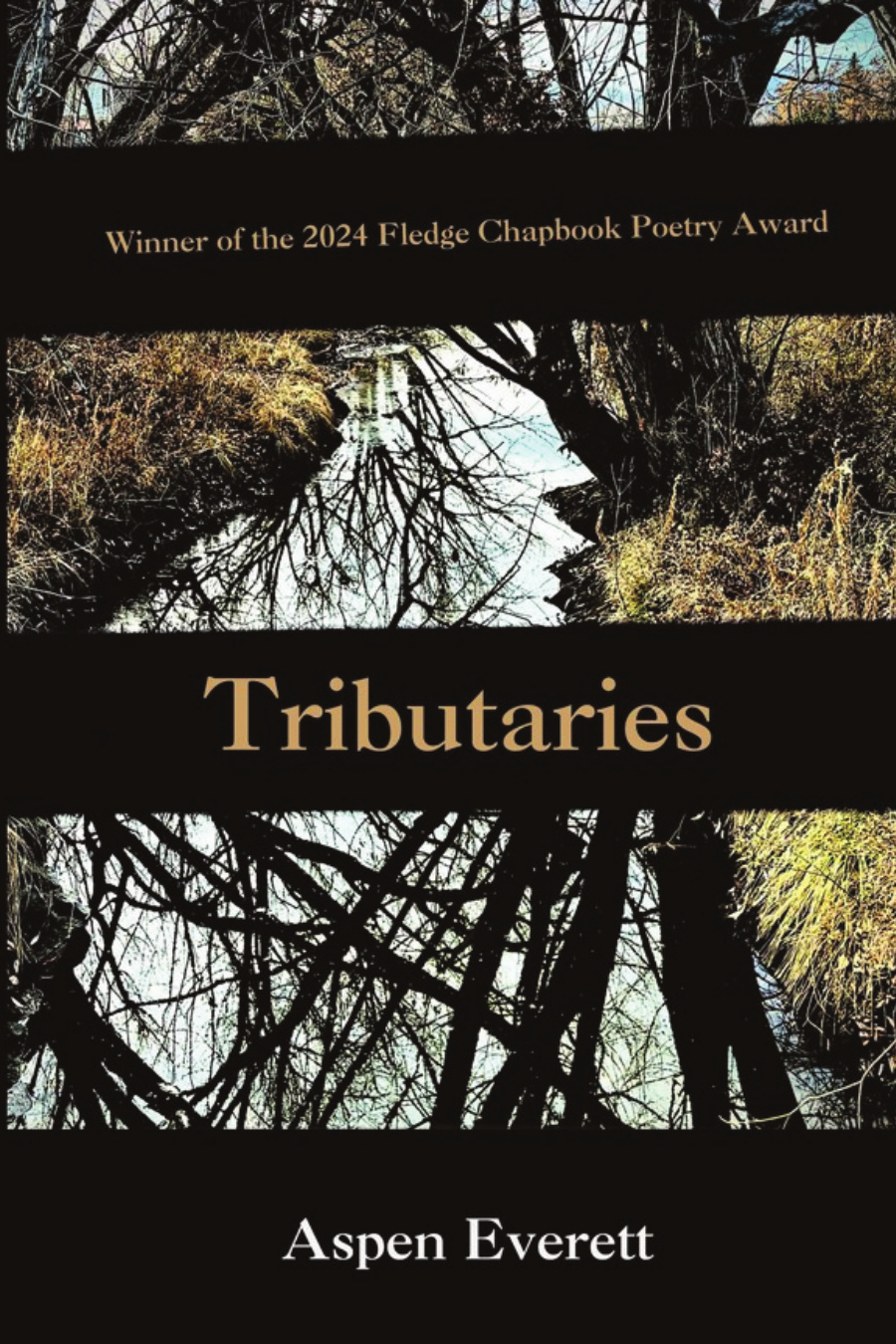

Tributaries
Tributaries is as meditative as it is demanding. The collection utilizes both linguistics and novel vocabulary to pull the reader on a journey of ecopoetics and despite everything an undercurrent of hope. Lines like “my signature, my debt / it cost more than i could know.” hits in deep stark parts of us that are in a constant state of anguish with the natural and commercial world. The economy of words throughout these poems is also particularly impactful. The final line to “More than Human,” “We are but breathing / bodies of Water / holding one another.” ran me over and picked me back up again. In fact, the entire poem is lush with explanations of how we can be a more cohesive, more kind, and more compassionate resident of the earth. This theme is carried throughout the entire collection, asking the reader to become introspective in a way that revolutionizes our relationship with nature, capital, and the ideal self.
—Joshua Robinson, editor of Screaming at America: An Anthology of Dissent, and author of This Way to Exit, Millennialism & New Poems, and Homeless with God.
In Tributaries, poet Aspen Everett is "wades the waters of me / muddied in misunderstanding / taken for granted." This collection is brimming with sonically-charged poems that engage water and beyond-human beings on an elemental level, while also being attuned to the way that man-made history and our own misdeeds haunts the landscapes around us. Ultimately, these are poems in which "poets remember to listen," and what answers "are but breathing bodies of Water / holding one another."
—Sage Marshall, author of Echolocations
Aspen Everett’s Tributaries evokes the spirit of the land with intense beauty and power, bestowing a sense of communion with Earth’s presence. Superbly crafted in their use of sound, distinctive imagery, and white space, the poems are alive with the ghosts of topsoil loss over Kansas and the sky’s “cloudless teeth” as well as tree limbs “toppled in the rush of weather reaching into the infinite blue.” The poems read like a kind of embodied prayer that comes from a place of deep connection with the more-than-human-world with language that at times feels incantatory with a mythic quality. Everett’s question in “A {Paleocene} Sea of Possibility” “which thin brittle branch shall support the weight of unknowing?” is a question for our times. The poems in Everett’s Tributaries touch the vulnerable space of unknowing we currently live in with its grief and beauty found in equal measure.
—Anna Citrino, author of A Space Between
About the Author
Aspen Everett is a poet and creative from the wind-tossed flatlands of Southeast Kansas. Writing what they call Heathen Mythology, Aspen aims to rewrite the cultural myths of dominion and return readers to reverence for the More-than-Human. Following fetid rivers upstream until the waters ran clean, they find themselves in Boulder Colorado, beneath the shadow of Mt. Arapaho.
Tributaries is their first book.
- 74 pages
- Paperback
- 6in × 9in
- Black & White
- 979-889832608-1
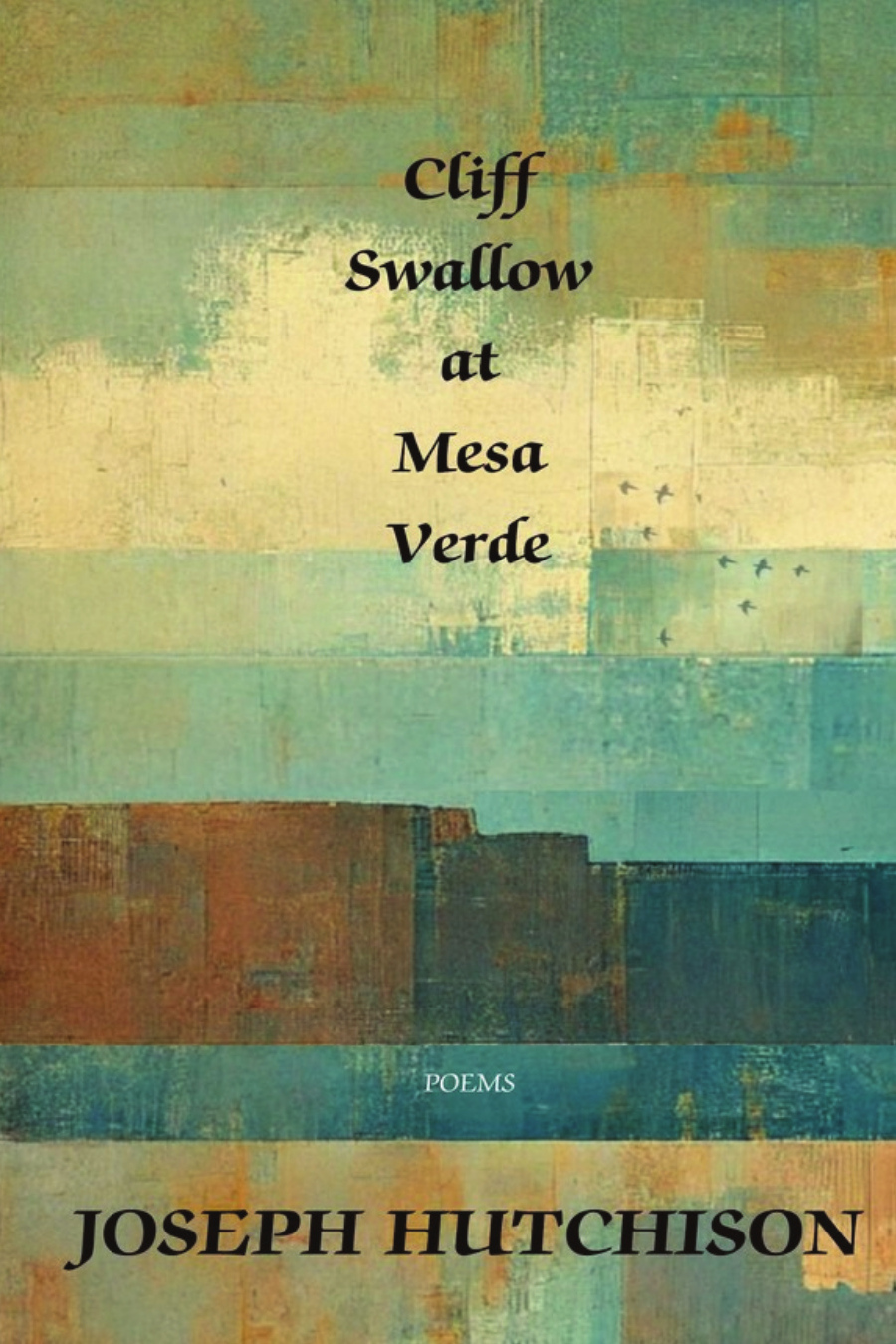

Cliff Swallow at Mesa Verde
A slim chapbook offering from award-wining and former Poet Laureate of Colorado (2014-2019) Joseph Hutchison.
SYNOPSIS:
In Cliff Swallow at Mesa Verde, Joe Hutchison ask Winter not to wake up, although we can feel it dreaming in hiding—dreaming in the denned fox, in the dark-swaddled seeds and also in us. But these are also poems about how these things are also part of life, part of “a dreaming on which time itself is made.” The poems in this chapbook live the seasons verses naming them. Griefs large and little, personal and universal. The wonder of the world breath that becomes ours but will also slip back into the world’s breath— “Thin fire flickers in the nest of old news”—and in between those bookends, we who look and listen to both beauty and the shadow nature embodies, learn to define ourselves with the language of nature.
REVIEWS:
"These are poems made of deep listening—to the words of other writers, to the earth, to silence, to history, and to the poet’s own inner voice. Because of this attentiveness, as I read Cliff Swallow at Mesa Verde, I felt invited into the best kind of conversation—the kind in which we discover the world, and ourselves, again and again."
—Rosemerry Wahtola Trommer, author of The Unfolding and host of The Poetic Path
"There is the double exposure of the veteran’s experience —a kind of haiku of tragedy—in the return home, and the length of healing for wounds of depth. There are rituals of light wherein we place our love and our loved ones—'You blink, and they’re gone'— and by which we solemnly wonder at the richness of the world we might not know without having been the ones to survive somehow—'The kindling catches,/ and as always, intimations of renewal/ glint in your eyes, flaring for an instant' and how the life of the individual is both contrasted with and beautifully enfolded into that eternality of spirit, song, joys, love. Cliff Swallows at Mesa Verde whispers of the multitude of ways in which we are forever finding, losing, and only then rediscovering the deep interconnection of all life. An intimate look at impermanence and the emotional complexity of the world. Hutchison reminds us, 'Not to understand is ok […] Just listen.' "
—David Anthony Martin, author of The Ground Nest, Bijoux, Deepening the Map, and Span, and founding editor of Middle Creek Publishing & Audio
ABOUT THE AUTHOR:
Joseph Hutchison has served as Poet Laureate of Colorado (2014-2019) and is the author of 19 collections of poems, including The World As Is: New & Selected Poems, 1972-2015; Eyes of the Cuervo/Ojos del Crow (a bilingual edition of his Mexico poems translated by Patricia Herminia), Marked Men, Thread of the Real, Bed of Coals (winner of the Colorado Poetry Award), and the Colorado Governor’s Award volume, Shadow-Light (OP). He has also translated Ephemeral, a collection of flash fictions by Mexican author Miguel Lupián. His poems have appeared in over 100 journals and several anthologies, including New Poets of the American West, and he has co-edited three anthologies, Malala: Poems for Malala Yousafzai (all profits benefit the Malala Fund for girls' education worldwide), Legions of the Sun: Poems of the Great War, and A Song for Occupations: Poems About the American Way of Work. Joe currently directs two graduate programs at the University of Denver’s University College: Professional Creative Writing and Arts and Culture Management. He lives with his wife, Iyengar yoga instructor Melody Madonna, in the mountains southwest of Denver.
- 37 pages
- Paperback
- 6in × 9in
- Black & White
- 979-889868066-4
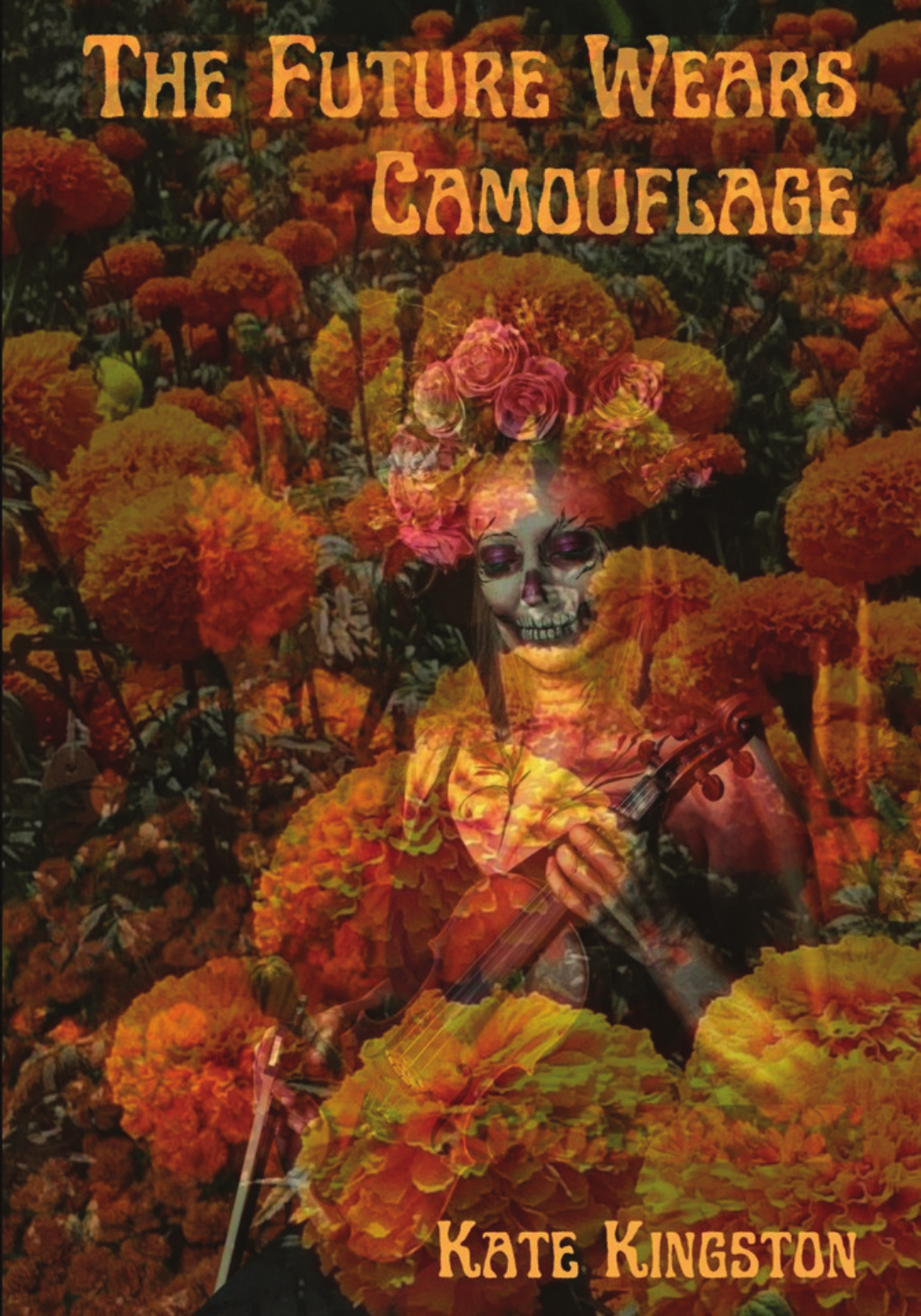

The Future Wears Camouflage
To read Kingston is to be immersed in a world where all your senses are engaged at once: each poem a photo, a song, a scent. This collection invites us to voyage first to Mexico and then through a range of other sensory landscapes – both literal geographies and the geographies of childhood, motherhood, loss and love. In often incantatory rhythms and always lush sounds, we are shown how to relish language as a tool for full participation in experience, “as if each spice were its own vowel, each seasoning another consonant.” This is a volume you’ll want to read aloud: “all it asks of you is to taste, just taste.”
—Lisken Van Pelt Dus, author of How Many Hands to Home
In The Future Wears Camouflage Kate Kingston dazzles as few poets can. By turns imagistic, declarative, insistent, hers is a voice of urgency, from which language rich and daring never fails to delight while simultaneously stealing one’s breath. What lies on the surface becomes transformed, multi-layered, a deep dive or an ascending nova. Whether addressing students disappeared in Mexico or aspects of her own life, these poems come from an imagination with fierce sparkle and focus. Read “La Costa Rica” and remember why you fell in love with poetry.
—Peter Ludwin, author of An Altar of Tides
The poetry of Kate Kingston enters the reader as oracle full of revelation, sensory experiences and the magical language that embodies her work. Día de los Muertos in Mexico comes alive in the incense of copal, the taste of calla lily, the marimba of street music, wail of La Llorona, and the touch of the turtle’s shell. We follow Kingston as she “walks a field of tombstones,” dances “rumbas in the alley with painted skeletons,” and becomes “lost in the turbulence of celebration, hair strewn with flower petals, confetti and shards of light.”
—Susan Florence, author of Leftover Prayers
Kingston begins with a Foreword Poem: “Portrait of Mexico.” Her words fill her mouth like hornets, ready to buzz, sting, and protect her, “hive of vowels”. The poet’s narrative voice invokes their five senses with a fusion of body parts. The iris of her eyes, “smells of cinnamon bark”, their hair grows like a, “forest of coriander”. Here, Kingston revels in Magic Realism, where the ordinary is fantastical and everyday magic is evident. This conjuring of duende commences her collection.
—Shelli Rottschafer, Professor of Spanish and Chicanx Literature.
ABOUT THE AUTHOR
Kate Kingston is the author of five collections of poetry. She is the recipient of the Crestone Wayfarer Poetry Award, the Karen Chamberlain Award in Poetry, the W.D. Snodgrass Award for Poetic Endeavor and Excellence, the Ruth Stone Prize, and the Atlanta Review International Publication Prize. Kingston has been awarded fellowships from the Colorado Council on the Arts, Harwood Museum, Helene Wurlitzer Foundation, Jentel, Ucross, and Fundación Valparaíso in Mojácar, Spain, among others. Several of her poems have been nominated for a Pushcart Prize.
- 101 pages
- Paperback
- 7in × 10in
- Black & White